Food Safety Preventive Controls Alliance Education and Outreach Goes Global

The 2011 Food Safety Modernization Act (FSMA) was the first major update of federal food safety laws since 1938. FSMA gives the U.S. Food and Drug Administration (FDA) broad new authority to ensure that the food industry takes responsibility for preventing food safety problems, detects and responds to food safety issues and improves the safety of imported foods. Since September 2015, FDA has finalized and published seven foundational rules under FSMA (Table 1).
The two Preventive Controls rules require registered facilities that manufacture, process, pack or hold human or animal food to have one or more “Preventive Controls Qualified Individuals (PCQIs).” Both domestic facilities and foreign food processors exporting food intended for sale in the U.S. must comply with the Preventive Controls regulations unless an exemption applies. Each facility, unless covered under an exemption or modified requirement, will be required to implement a written food safety plan that focuses on preventing hazards in the food. The PCQI will be responsible for performing or overseeing the implementation of the facility’s food safety plan, namely preparation of the food safety plan, validation of the preventive controls, review of records and reanalysis of the food safety plan. The Preventive Controls rules require that a PCQI must have either successfully completed training in the development and application of risk-based preventive controls at least equivalent to that received under a standardized curriculum recognized as adequate by FDA or be otherwise qualified through job experience to develop and apply a food safety system.
FDA recognized the importance of its role in facilitating the development of industry training, and in 2011, in cooperation with the Illinois Institute of Technology’s Institute for Food Safety and Health (IIT IFSH), a nationally recognized leader in food safety, FDA created the Food Safety Preventive Controls Alliance (FSPCA). The mission of the FSPCA is to develop the standardized curricula recognized by FDA to help the domestic and foreign food industries comply with the requirements of the Preventive Controls rules for human and animal food. These standardized curricula were developed with the assistance of public and private partners, including state, federal, tribal and international governments, industry and academia.
The FSPCA standardized curricula (Figure 1) for human and animal foods address preliminary steps and resources for developing a food safety plan, types of food safety hazards, conducting a Hazard Analysis, identifying preventive controls for hazards, monitoring preventive controls, verification and validation, and corrective actions/corrections, recordkeeping and regulatory requirements.
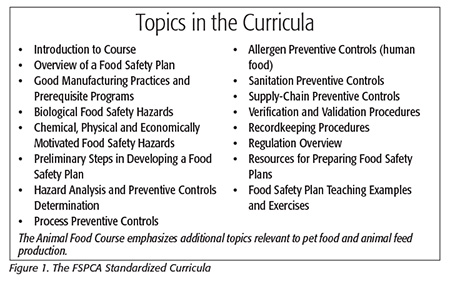
Building FSPCA Trainer Capacity
In October 2015, implementation of the FSPCA standardized curriculum training (aka the “participant course”) for human food began by using the train-the-trainer model to build capacity of Lead Instructors who could then independently offer the FSPCA standardized curriculum participant courses directly to industry and other participants. FSPCA-recognized trainers of trainers started offering a series of FSPCA Lead Instructor courses on how to teach the FDA-recognized standardized curricula participant courses for both human and animal food. To become an FSPCA Lead Instructor for human or animal food, the alliance requires the following three steps:
1. Successfully complete the full 2.5-day FSPCA Preventive Controls for Human Food Participant Course or Animal Food Participant Course (whichever is of interest). Participants who complete the course(s) will receive a serially numbered certificate for course completion from the FSPCA, the Association of Food and Drug Officials (AFDO) and the International Food Protection Training Institute (IFPTI).
2. Complete and submit the online application to be considered as an FSPCA Lead Instructor Candidate. Applications are reviewed by the FSPCA Review Committees and evaluated against selection criteria that include education, work experience in or with the food industry and food safety training experience. If approved, proceed to step 3.
3. Successfully complete the full 2.5-day FSPCA Lead Instructor Course for Human Food or Animal Food. Participants who complete the Lead Instructor Course(s) will receive a serially numbered certificate for course completion from the FSPCA, the AFDO and the IFPTI. Completing this training allows Lead Instructors to independently deliver the FSPCA Preventive Controls for Human Food or Animal Food participant courses.
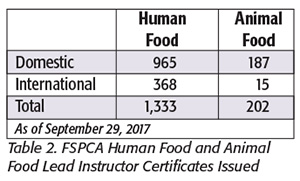
Table 2 shows the number of certificates that have been issued to Lead Instructor Candidates who have successfully completed the FSPCA Lead Instructor courses. An example of a certificate is shown in Figure 2.
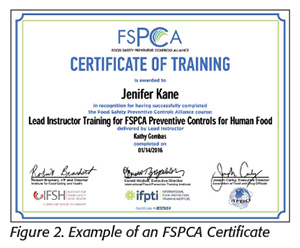
A list of current FSPCA Lead Instructor courses for both human and animal food is posted on FSPCA’s website[1] and is periodically updated as courses are approved by the FSPCA.
Rollout of FSPCA Participant Courses to Industry and Regulators
In 2016, the network of trained FSPCA Lead Instructors for human and animal food started offering the FSPCA Preventive Controls participant courses to the food industry. Regulators also signed up for the FSPCA participant courses, as FDA decided to have its food safety staff, including state regulators, attend the FSPCA Preventive Controls training with industry so they can receive the same information.
The FSPCA Preventive Controls participant courses are being offered worldwide, as Lead Instructors are becoming more prevalent across the globe. Table 3 shows the numbers of certificates that have been issued to participants who have successfully completed the FSPCA participant courses for both human and animal food.
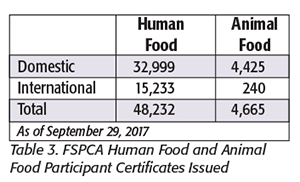
A list of current FSPCA participant courses for both human and animal food is posted on FSPCA’s website.[2]
FSPCA International Training and Outreach Efforts
The FSPCA recognized the need to ensure that training and outreach opportunities were available to international food businesses consistent with those provided domestically. In July 2015, the FSPCA formed an international subcommittee to establish trainer and technical assistance networks. This was done to develop and disseminate outreach, education and technical materials for Preventive Controls for human food and animal food in a manner consistent with domestic efforts and considers cultural, political, religious, economic, technological and language differences and needs. A Core Outreach team was charged with identifying and engaging experts for three work groups: the Trainer Network Work Group, the Training Content Work Group and the Technical Assistance Work Group. The International Subcommittee Core Outreach Team, along with the three work groups, has developed an action plan (Figure 3) that is being implemented and will be updated semiannually.

The Trainer Network Work Group is charged with developing and executing a plan to employ the educational materials in capacity-strengthening efforts and make them available to the international community. It has initiated a strategy designed to increase capacity of international instructors, both human and animal food trainers of trainers and Lead Instructors, focusing on human food first. The group has initially targeted countries with the greatest number of FDA-registered facilities and approved FSPCA Lead Instructor Candidates.
The Training Content Work Group is charged with developing educational materials for an international audience that address the final rules and articulate the changes industry will need to make as a result of the rules’ implementation. These materials are being written in a manner sensitive to varied cultural, political, trade, language and technological needs and capacities. A key role of this group is to establish quality and consistency checks for each of the key foreign languages, namely Chinese, French, Hindi, Japanese, Portuguese and Spanish. The group’s Educational Review Teams will assess the translated FSPCA training materials, determining the point at which the versions will be endorsed officially by the alliance. To date, this work group has piloted and completed its first version of the Spanish FSPCA human food training materials, identified as “S1.” The Spanish Educational Review Team is finalizing “S2,” which should be available shortly. The group has also translated the FSPCA human food training materials into Chinese and Japanese, which are in the pilot phase with a completion target end of 2017.
The International Technical Assistance Work Group is charged with establishing an International Technical Assistance Network (iTAN) and will identify international experts in food safety and FSMA-related subjects. These international food safety experts (FSEs) will be responsible for providing technical assistance by addressing scientific and technical questions from the public. The public can submit a question using the FSPCA Technical Assistance Network online submission form.
Answers to questions will be the result of a collaboration among multiple FSEs. The FSEs will not answer regulatory interpretation questions; these types of questions will continue to be handled by the FDA FSMA Technical Assistance Network. To be considered for iTAN membership, interested candidates must be FSPCA Lead Instructors who are actively teaching FSPCA Preventive Controls courses.
The iTAN will be staffed by volunteer FSEs, and the selection process for FSE candidates is underway. FSEs will be selected based on their expertise, geographical location and FSPCA Lead Instructor credentials. The FSPCA will conduct a pilot program in 2017 with a small number of international FSEs selected by the FSPCA International Technical Assistance Work Group Review Board.
FSPCA Foreign Supplier Verification Programs (FSVP) Curriculum and Training
In addition to developing the Preventive Controls standardized curricula for human and animal foods, the
FSPCA has completed the process of piloting the new Foreign Supplier Verification Programs (FSVP) participant and Lead Instructor courses.
The FSVP participant course provides participants with the knowledge to implement the requirements of the Foreign Supplier Verification Programs for Importers of Food for Humans and Animals regulation. This course is designed for:
• U.S.-based importers who meet the definition of “importer” in the FSVP rule, which includes those who own or are the consignee of food at the time of entry or, if no owner or consignee exists, the U.S. agent or representative of the foreign owner.
• Others who have an interest in ensuring that the requirements of the FSVP rule are met, including brokers, exporters, foreign suppliers of food that will be exported to the U.S., persons/business owners who currently buy food from foreign sources and representatives of foreign governments.
This curriculum was designed by regulatory, academic and industry professionals and developed with FDA funding as part of the FSPCA. In contrast to the Preventive Controls rules, the FSVP rule does not require one to attend a training program following a standardized curriculum recognized by FDA. Attending this course, however, will help one understand the FSVP requirements and how they can be met in the attendee’s particular circumstance. A current list of FSVP courses is posted on FSPCA’s website.[2] Table 4 shows the number of certificates that have been issued to participants who have successfully completed the participants course for FSVP.
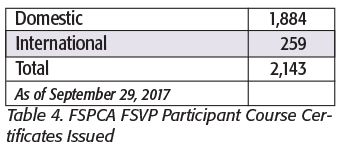
FSPCA FSVP Lead Instructor Course
FSPCA developed this course to provide Lead Instructor Candidates with the knowledge and tools needed to perform the duties of a Lead Instructor for the FSVP participant course.
The Lead Instructor course content focuses on strategies to aid in the effective instruction of the activities and documentation that support the creation and implementation of the FSVP rule. Administrative tasks for issuing FSPCA certificates are also covered, as well as a refresher on effective presentation for the adult learner.
Completing this instructor training allows one to deliver the FSPCA FSVP participant course as a Lead Instructor. For more information about the criteria to become an FSVP Lead Instructor, go to www.ifsh.iit.edu/fspca/courses/
foreign-supplier-verification-programs-fsvp. Table 5 shows the number of certificates that have been issued to Lead Instructor Candidates who have successfully completed the FSPCA FSVP Lead Instructor courses.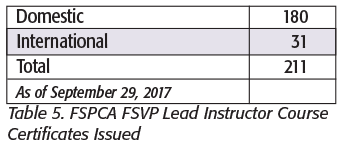
Other Alliances
The FSPCA is modeled on a similar alliance, the Seafood HACCP (Hazard Analysis and Critical Control Points) Alliance created in 1994. The Seafood HACCP Alliance is a public-private collaboration that developed the seafood HACCP standardized curriculum that has been the foundation for assisting the industry.
This alliance is a nationwide network of processors, university researchers and governmental agencies that assists the seafood processing and importing industry with the implementation of HACCP programs. For more information about the Seafood HACCP Alliance, visit www.afdo.org/seafoodhaccp.
The Produce Safety Alliance, established in 2010, is a collaboration between Cornell University, FDA and the U.S. Department of Agriculture to help prepare fresh produce growers to meet the regulatory requirements included in FDA’s Produce Safety rule. For more information about the Produce Safety Alliance, go to www.producesafetyalliance.cornell.edu.
The Sprout Safety Alliance is a public-private partnership created by FDA and IIT IFSH in 2012. The alliance has developed a core curriculum, training and outreach programs for stakeholders in the sprout production community to enhance the industry’s understanding and implementation of the requirements in FDA’s Produce Safety rule and best practices for improving sprout safety. For more information about the Sprout Safety Alliance and course offerings, go to www.ifsh.iit.edu/ssa.
Kathy Gombas recently retired as the senior adviser for FSMA implementation at FDA’s Center for Food Safety and Applied Nutrition. She is a recognized food safety expert with 30 years of experience in preventive controls, supply chain management and food safety auditing. She supported FDA’s FSMA implementation efforts and launch of FDA’s FSMA Technical Assistance Network for industry. She is currently a member of the FSPCA Steering Committee and co-chair of the International Subcommittee working on industry training, outreach and technical assistance programs for food companies worldwide and is on the Editorial Advisory Board of Food Safety Magazine.
References
OK1. Human Food Lead Instructor Courses: www.ifsh.iit.edu/fspca/fspca-preventive-controls-human-food#LICS. Animal Food Lead Instructor Courses: www.ifsh.iit.edu/fspca/fspca-preventive-controls-animal-food#AFLICS.
2. fspca.force.com/FSPCA/s/courselist?language=en_US.
Looking for quick answers on food safety topics?
Try Ask FSM, our new smart AI search tool.
Ask FSM →







